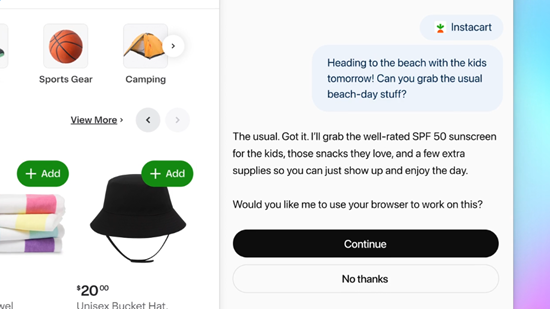ChatGPT Atlas positions AI as the internet's gatekeeper
We’re shoehorning AI into everything else, so why not your web browser? That was presumably the thinking when OpenAI launched ChatGPT Atlas, an AI-augmented browser that it says will change the way we use the internet.
Launched on macOS on 21st October, Atlas’s main sell is conversational interaction with the web via a ChatGPT sidebar. It also adds contextual menus for AI assistance, and can automate searches and other tasks.
Use cases shown off by OpenAI include summarising web pages, reviewing and rewriting emails via a prompt (for example, “make this sound more professional”), and finding items to add to your basket when shopping.
It also includes “native agents” that string tasks together - for example, you could provide ChatGPT with a recipe and have it find a grocery store, identify the required ingredients, and order them for delivery to your house.

Reliability and security
All the common concerns around the current generation of AI also apply here. How reliably can we trust ChatGPT to summarise web pages? Will people use it to type emails to a degree where we lose any humanity at all online? It’s not hard to extrapolate to a future where my browser agent talks to yours, and all emails consist of dull AI-generated and AI-parsable text.
OpenAI’s demo video shows a user asking Atlas to buy supplies for an upcoming beach trip: sunscreen, snacks, and a beach ball. It browses the site and adds the items to their basket, and all they have to do is pay. At face value, it’s impressive. But when you consider all the small decisions that go into even this basic shop, it’s difficult to imagine the output will be very reliable. Without direction, Atlas won’t know what Jimmy’s favourite snack is, or what type of beach toys the kids already have. That’s also a low-stakes scenario - imagine letting it loose with a logged-in session at your bank.
When you consider all the context and small decisions that go into even basic tasks, it's hard to imagine the output will be reliable
OpenAI has built in safeguards. It says Atlas cannot automatically execute code or install extensions, that it can’t access other apps or the file system, and that will “pause to ensure you’re watching it take actions on specific sensitive sites like financial institutions”. However, even in its release blog post, it’s made clear that it’s not immune from errors or prompt injection:
“ChatGPT’s agent capabilities still carry risk. Besides simply making mistakes when acting on your behalf, agents are susceptible to hidden malicious instructions, which may be hidden in places such as a webpage or email with the intention that the instructions override ChatGPT agent’s intended behaviour. This could lead to stealing data from sites you’re logged into or taking actions you didn’t intend… Our safeguards will not stop every attack that emerges as AI agents grow in popularity.”
The future of the web?
Large language models (LLMs) are already changing how users discover data, and I wrote before about how they cut into traffic to media sites, threatening the very information pipeline they rely on. Naturally, OpenAI expects AI-enabled browsers to have a significant impact on the future of the internet. “AI gives us a rare moment to rethink what it means to use the web,” it said.
This view is shared by serial internet entrepreneur Greg Isenberg, who posted on X that he expects AI to quickly upend people’s browsing habits:
“The average person won’t Google, click, compare or fill out forms within the next 24 months. They’ll just say ‘book my trip’, ‘find me a job’, ‘launch my store’ and the agent will do the 20 steps behind the scenes… Whole industries… are about to get rebuilt around outcomes instead of pages… The web is shifting from human browsing to agent doing.”
I’m skeptical about the timelines, but still worried about this direction. When mobile apps arrived on the scene, some businesses neglected their websites in favour of in-app experiences that could be controlled more closely and tracked more granularly. Challenger bank Monzo, for example, offers only limited browser access to its accounts, intended for emergencies.
If interaction with services via in-browser AI agents becomes widespread, we could see an even more extreme version of this shift. If companies favour agent interaction, it’s possible their human-accessible sites could disappear altogether, with users limited to interactions via their AI chatbots. That has further implications for transparency and user agency on the web.
A rose-tinted web filter
By placing AI models between the user and the web, we’re putting full trust in the companies behind them. We’ve already seen government censorship of LLM responses in places like China, and even closer to home, ChatGPT itself will refuse to talk about certain historical topics due to concerns around hate speech. If these models become the filters through which we access the internet, records of the atrocities of the past could effectively be scrubbed.
Less drastically, I expect the day-to-day online experience when using an AI browser will be much more sanitised. The Wild West internet of the 1990s and 2000s was already toned down by the rise of platforms like Facebook and Twitter, but users reliant on an AI chatbot to feed them content are unlikely to encounter anything outside of a homogenised, Valley-centric worldview.
If the concept takes off, AI browsing will obscure the web even further from the average user, with less traffic to anything creative or unorthodox, and more clustering around corporate sites. OpenAI says Atlas will change the future of the web, but if users must rely on AI as an intermediary, that change might not be positive. A smaller, safer, and more controlled online experience removes what made the internet valuable in the first place.

